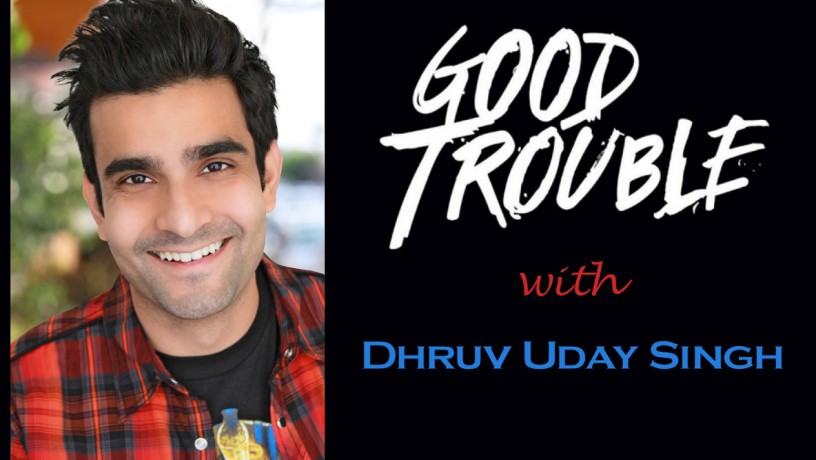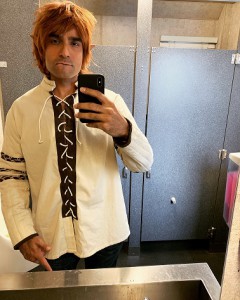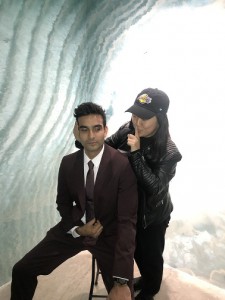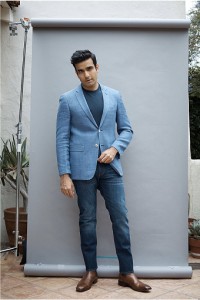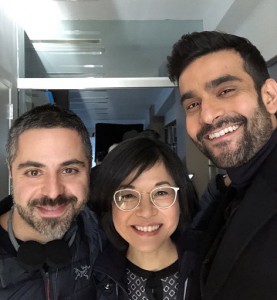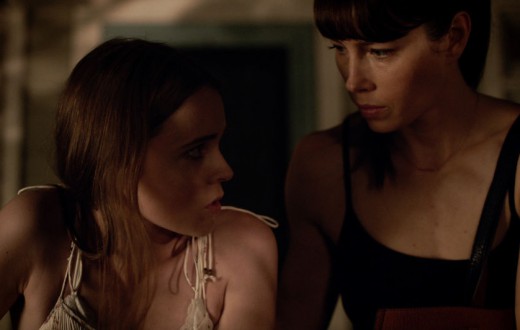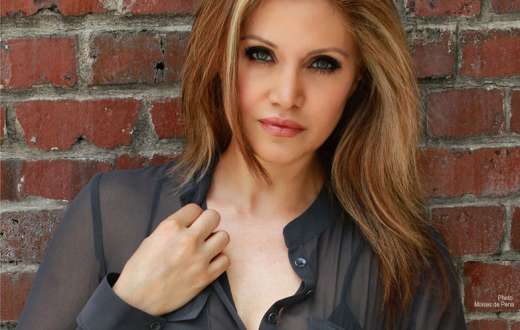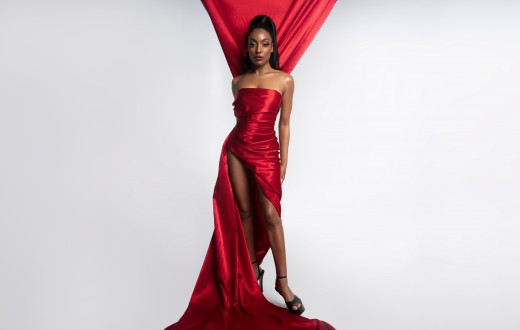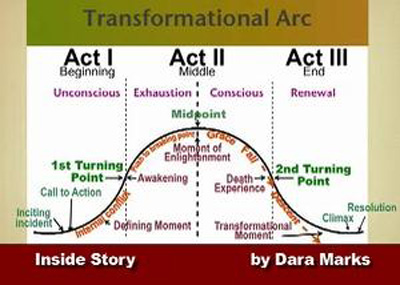Dhruv Uday Singh of Freeform’s Good Trouble is an actor, a serious comedian and an improv extraordinaire.
In the acting world, improv, otherwise known as improvisation, “is a form of live theatre in which the plot, characters and dialogue of a game, scene or story are made up in the moment. Often improvisers will take a suggestion from the audience, or draw on some other source of inspiration to get started.” – The Hideout Theatre.
Remember in The Shining when Jack Nicholson says “Heeeeeere’s Johnny”? Yep, that was improvised!
It isn’t all fun and games…except when it is. Improv is a beast and you either love it, hate it or pretend to love it or hate it.
Dhruv Uday Singh gives us an inside look at how improv can improve your acting skills, even if you’re an introvert.
You currently play Raj Patil in the Freeform series Good Trouble. Tell us about your audition.
My audition for Good Trouble came through my managers at Art/Work Entertainment. They sent me sides for two scenes. Since the part was initially a smaller role (I think I had two lines in the pilot), the audition was just one round and there were no chemistry reads. Jon M. Chu (who directed the pilot), the creators and the E.P.’s of the show, and the casting directors were all in the room. I’m grateful because they created an incredibly warm atmosphere for actors, which led me to feel comfortable improvising some buttons and sinking into the character. Happily for me, the role grew a lot over the course of the first season, and by Season 2 was a major part. Weee!
Dhruv Uday Singh decides to don an Elf costume for an episode of Good Trouble.
Your character, Raj Patil, is a dorky, magical nerd which you pull off real well. Does that mean you’re a nerd in real life? Or are you just a great actor?
First off, thank you for the kind compliment about my performance! And thanks for the compliment you didn’t say but I’ll conveniently imply, about me being a great actor.
The truth about Raj’s nerddom lies in the middle, I think. He’s more of a dork than I am, so I’m definitely cranking the social awkwardness of the character, but it’s not exactly like I have nothing to draw from. For example… oh I dunno… when I was thirteen, I HTML-coded a website as a Valentine’s Day gift for my girlfriend.
On the other hand, I’ve recently also gotten to play characters with a radically different energy – On a recent episode of FOX’s Prodigal Son, I play a way cockier, crooked insurance guy. In a movie called Lucky that would have premiered at this year’s tragically/understandably cancelled SXSW festival, I play a spooky, hard-to-trust husband. I’m just bringing these up so everyone will know I’m not actually a big dork!!! I’m not!!! </honesty> (HTML humor)
On Good Trouble, do you have a trailer or dressing room? How many days a week do you generally work on the show? Is there wardrobe or you pick out your own? Do your call times differ or are you always called to set at the same time?
Yes, the cast-members have trailers on the show. My weeks on the show vary episode by episode, but it is often between four to five days a week when the show is shooting. The show shoots extremely efficiently (the crew is really incredible!), with a three-camera set-up for coverage, so we’ll often slice through upwards of seven pages a day.
The wardrobe is masterminded by an incredible costume designer, Deena Appel. You might recognize her work, because it’s majorly elevated every project she’s done. (She designed the outfits on Austin Powers, for instance.)
My call times differ a lot depending on the episode. Episodes set at specific L.A. locations can often involve late-night shoots, since the show’s characters enjoy a raging nightlife. (Just like me, by the way – not a dork). The stuff on the Speckulate set, however, usually has more consistent call-times since the scenes occur during typical workdays.
Dhruv Uday Singh with Good Trouble co-worker Sherry Cola.
Is it hard to answer interview questions about the future of Raj and his girlfriend, Mariana (played by Cierra Ramirez)? Aren’t actors the last to know?
It is hard to answer those questions, but only because of discretion on behalf of the writers! The show’s creators are super-kind and clue me in to the larger plot-lines about my character ahead of time.
You studied film and creative writing at USC. Was there an audition process for this school? What was the most memorable lesson you learned at USC? Did you graduate?
There was no audition process, since I wasn’t in the drama program – but I do recall submitting a lot of written work. It was an undergrad degree, so it wasn’t quite as exacting as the grad programs, I don’t think. I learned a decent amount at USC: for example, how to host a crazy house party with no cups. No, I did learn a lot from specific teachers: the novelists Aimee Bender and T.C. Boyle were amazing mentors, and a film history professor named Rick Jewell exposed me to a ton of amazing movies I would never have seen otherwise. The biggest thing I’ll credit my experience at USC with is igniting a love of film that I think I’ll always have.
This is trite, but I learned exponentially more in the three years after college than I ever did in school. I started interning and then working at a medium-sized production company in Sherman Oaks, answering phones, reading scripts, and writing coverage. It taught me a lot about the machinations of the Hollywood system. A couple years later, I started improvising, and the rest, as no one would say about this situation, was history.
You began at USC when you were 17 years old, moving from India to LA. Were you scared? Who paid your bills? Did you have a job while in school? Where’d you live?
To the first question – oh, yeah. The experience was everything from unbelievably exciting to totally terrifying. Not only was I undergoing your boilerplate leave-your-parents-and-become-an-adult transition, but also being blasted by culture shock from transplanting to the exact opposite end of the planet. It was like spinning plates on my head while learning to dance, and no dance is more complicated than the “assimilation tango”. But looking back, I’m so grateful – coming to L.A. taught me a ton about myself, and, like many immigrants, the move gave me a burning drive to succeed.
To the second and third questions – I got a Presidential scholarship to USC, and that helped make finances way more comfortable. I’d work summer jobs back home in Mumbai (I was briefly a staff writer at The Bombay Times), and those combined with my folks’ help all helped pay the bills. But, truly, more than anything, I owe so, so much to my parents those years.
I started off living in the “scholarship dorms” on campus, and moved in with some friends in Downtown L.A. my sophomore year.
You really love improv and perform at the Upright Citizens Brigade Theater in Los Angeles. You’re also an alumnus of The Groundlings Sunday Company and a frequent guest on shows at The Groundlings. Should every actor do improv or it’s not for everyone? Does improv help introverts?
I do love improv! I love improv so much. It’s one of my favorite things on earth! Sometimes I can’t believe it’s an actual style of performance that we’re allowed to do in front of paying audiences.
I also attribute nearly all my acting chops to performing improv. It’s taught me how to experience scenes honestly, it’s made me relaxed in front of audiences, it’s helped free up my authentic self on screen, and it’s my favorite window into developing a character. It’s also the most fun possible tool to keep your muscles strong when you aren’t working, in front of the best acting teacher possible: a live audience.
Incidentally, I really miss the thrill of audiences in these quarantined times. Champagne problems galore, I know. But if you’re looking to do it, there are a ton of live-stream opportunities out there.
As far as the introvert question: I think improv can absolutely help bring you out of your shell, if that’s your desire. The art-form is built on a ton of philosophical vertebrae: principles like “Say ‘yes and’”, “Follow the fear”, “The bold choice is the correct choice”, and so on. To get better at improv, you have to practice these ideas with each performance. When you practice these principles on stage, they can’t help but seep into your life. (Of course, the inverse is true, too: the principles you practice off the stage or screen can also influence your work, for better or for worse.)
Should every actor do improv? Well, it’s kinda like Crossfit, or vanilla-scented candles, or Indian food. It’s not for everyone. That’s no reflection on anyone, by the way: some people (from all walks of life) will respond strongly to improv and want to pursue it, while others (some of them great comedic actors, stand-ups, and clowns) won’t care for it at all. It’s just how the suit fits you. My advice to actors would be: Why not try it and see?
Yeah yeah. Everyone’s a comedian. What makes you think you’re one of us?
I don’t know how to answer that! Hm. I’ve had at least thirty people suggest things I should “put in my act”?
Now be serious and answer this question truthfully: Why?
Probably damage? The going theory is that comedians are always sublimating damage from their childhoods, some unhealed scars or scabs over trauma that they can’t stop itching. And so, early on, we learn to be funny to make things palatable, look those things in the face, and laugh at them. I think there’s some truth to that notion, but it isn’t the whole picture. And doesn’t apply to everybody, of course. But yes, when something knocks over your perspective as a child, it makes you see the world in a skewed way relative to most people. That tilt, that distortion, is the source of your comedic voice. I’m Dhruv Uday Singh, and this is my Masterclass.
Dhruv Uday Singh at a photo shoot.
You kiss a lot of women on screen. How do kissing scenes work? Do you do the actual kissing even during rehearsal? Is it real kissing or is there “acting kissing” where you kiss on the upper and lower lip, not full lips? Do you have a ritual before those scenes?
I’m imagining telling my seventeen-year-old self that, one day, a very astute interviewer will tell me, “You kiss a lot of women on screen” and then I’d be asked how kissing scenes work. Oh my God, I don’t know what I’d do. Probably go make a website.
Okay, these answers about kissing scenes all relate to the pre-COVID-era, because who knows when they’ll ever be done again. The following is also just my experience so far, so I can’t speak for how all sets work.
In kissing scenes, you kiss your scene partner with no tongue, unless the director – who you hopefully trust and respect and is trustful and respectful of you – instructs otherwise for specific reasons. It’s a real kiss. You don’t usually kiss during rehearsal, unless it’s necessary. (For example, if you have to make out while executing complicated blocking, like knocking over furniture in a specific order, which I’ve done.) I think it’s always considered respectful to freshen your breath – you should have some mints from crafty on hand.
The only “ritual” really is to help your scene partner feel as comfortable as possible before takes, as they will hopefully do for you. That goes double for sex scenes, of course. It’s an awkward thing to go to work and make out with your colleagues for your job, sometimes with very few clothes on – all the while attempting to show real chemistry between the characters. It goes without saying, but always be respectful and professional about the work. It helps love scenes a lot if you’re friends with your fellow actor. I’ve been lucky in getting to work with very kind people I enjoy working with, and that definitely trickles into the comfort we feel during any kind of love scene.
When you go up for roles, do they specify “someone who can portray Indian” or are the roles non-specific? What is your take on the Indian culture in a Hollywood setting?
In terms of what the role types specify, it’s been a mix. Sometimes the roles I’ve auditioned for are specifically Indian or otherwise “brown”. Just as often, though, they are general comedy or drama roles with no ethnicity attached. I don’t often mind either way, so long as there is something honest, funny, or interesting to play in the characters beyond their ethnic identity.
Regarding Indian culture in Hollywood… it’s a broader topic than I could justly explore in the scope of this interview. But, speaking broadly… No doubt people think there are limitations about certain roles for certain ethnicities, but I try not to pay attention to limits set by other people. I’m always interested in exploring ways to push the bounds of South Asian representation in Hollywood. For example, Raj is one of very, very few South Asian – and really just Asian – love interests in the history of the industry. Why is that? Why is the history of brown males on the global screen dominated by images like Apu (voiced and written by white people), or terrorists (played from the 80’s to the 2000’s by white actors in brown-face), or laughable dorky nerds? There’s a deliberate un-sexing of the caramel-assed man. For that reason, I know playing a brown guy with a sex drive isn’t that big a deal, but it does feel kind of quietly revolutionary.
You’ve directed several short films. How do you get into “Director mode” vs. “Actor mode?” Do you just wake up and say, “Wah-la! Today I’m going to direct!” For the planned schedule where you’re directing, is it hard to get into that mindset or does it come natural to you?
I really love directing – I believe it’s a perfect blend of my interests and talents. The mindset does come kind of naturally to me. I have a strong visual sense, I know how to work with actors from years of being one, and, perhaps from being an only child, I tend to know exactly what I want creatively. Being a director involves answering questions from every department head, so you have to know what you want.
When acting and directing simultaneously, you have to straddle both horses. The key, I think, is extreme preparation. I like to work on my performance far ahead of time, until I feel like snapping into the character and lines are second-nature. I’ll also storyboard and plan out the shoot well in advance with my D.P. I like to strive for a really fun, relaxed atmosphere on set, because that’s when people do their best work – but the only way to achieve this is to leave nothing to chance in preparation. By laying the groundwork in pre-production, you can then open yourself to the whims of chance that will inevitably be thrown at you on set.
The planned scheduling you mentioned comes fairly easily to me, since as an actor you get used to early call-times and a rigidly planned day.
Dhruv Uday Singh behind the scenes of Prodigal Son with Director Satya Bhabha and fellow actor Keiko Agena.
What advice do you have for people who want to get into the entertainment business?
Joining show business is running away with the circus. You’re not signing up for a normal life, because the circus isn’t normal. Some people thrive on the idea of normalcy, while others detest it. Personally, I think “normal” can often be socially disguised code for “boring” – but I’m a rebellious hippie at heart. Wherever you fall on it, know what it is you’re signing up for!
The other thing, if you want to succeed: you’ll have to work a lot, lot harder than if you follow a “regular” path. What looks like luck to others is usually the result of years and years of underappreciated, unseen, uncelebrated perspiration in the shadows. But here’s the catch: if you have chosen work that is right for you, a lot of that sweat will feel like play. Learning your craft – becoming great at acting, or comedy, or filmmaking, is a lot of work – and it will be punctuated by frequent, brutal, humiliating, and (sometimes) public, rejections that will occasionally knock you the fuck out. And yet, after every beating, eventually – you can’t wait to get back in the ring, to get back to work, to succeed. If you feel that way, then you should pursue it.
Finally: the entertainment business is mostly, in my experience, a confidence game. Not a con game – though there are several unscrupulous types who treat it as such – but a game of competing levels of confidence. As William Goldman wrote in his memoir Adventures in the Screen Trade, “Nobody knows anything.” Because nobody knows anything, everyone is looking for somebody who does. So be undeniable in your craft, and then know it. In simpler terms, I think the core of the whole game is the oldest cliché in the world: self-belief.
I’m pretty sure.
Or do I know?
Anything else you want to say?
Thank you, Ilana, for the really, really insightful and interesting questions! What a pleasure. I hope everyone reading is keeping well, staying safe, and washing their hands. </html>
You can visit Dhruv Uday Singh here:
Instagram: https://www.instagram.com/dhruvudaysingh/
Website: http://www.dhruvudaysingh.com/

